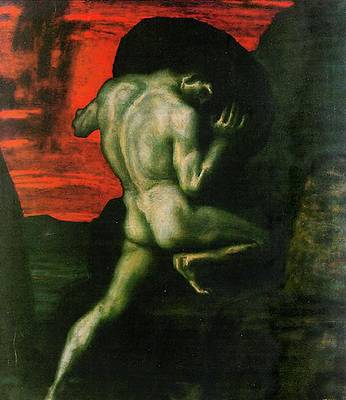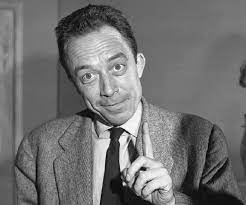An Armchair Psychoanalysis of Albert Camus
Did sex addiction slay one of the potential greats of the modern era?

Most often associated with French ‘Existentialism’ (a label he tried to escape all his life), Albert Camus is still today one of the most famous author-philosophers in popular culture. His primary works such as the Myth of Sisyphus, the Stranger & the Plague are still par for the course in many curriculums around the world.
He was the architect of his own philosophy, the philosophy of the Absurd, which in brief is centrally occupied with the question of freedom: why should we not kill ourselves given we are free to do so and there is much evil in the world? Phrased differently, Camus pursued the central question of how to find morality without God.
The man led a fascinating life.
Diagnosed with Tuberculosis at 17, he suffered continual bouts and was subject to all manner of dubious cures for the misunderstood disease throughout his life.
He influenced history throughout the last century. For example, on a recent Podcast RFKjr. mentioned his father impressing upon him the Stranger as an important book.
Camus started his early professional life as an actor. He then became a journalist in his mid 20s; first in Algiers and later for the Resistance newspaper Combat during the German occupation of France.
His mistresses included some of the biggest actresses of the age – Maria Casares and Catherine Sellers. His works were the best sellers for the preeminent French publishing firm at the time – the Gallimard’s – that also was home to Jean-Paul Satre and other top tier French intellectuals. He was dear friends to Satre and Simone de Beauvoir over a decade before politics caused their public fallout.
He even privately corresponded with several sitting French presidents, including De Gaulle, to not only secure the pardon of Algerian’s who were to be executed but also to attempt to bring about a peaceful solution to the problem of French colonialism of Algeria.
He wrote and directed popular plays, was an eminent journalist, a multi-time bestselling author & a Nobel prize winner.
As is natural with such a titanic persona, he was often caricatured contemporaneously for the making of hay by various political factions of the right and left. The same is true of his posthumous legacy. It thus stands that is impossible to truly give objective criticism or a full picture of such a prolific and complicated man, doubly so in such a brief article as this.
However, I will attempt to do so with the afore-mentioned caveat in mind.
Having read the biography by Olivier Todd, Albert Camus: A Life, and his works The Fall and Resistance, Rebellion and Death, there are key qualities of this man’s life that are worth pondering and drawing wisdom from, particularly if one has an ambitious literary bent with the talent and work ethic to match on the order approaching Camus.
I'll speculate on Camus’s womanizing. This is something that not all, especially readership of a male variety, may see as a flaw in of itself.
How can a man with such charisma, intellect and libido be tied down to just one woman? Particularly so if he has been through the fire of intransigent tuberculosis and a totalitarian occupation? Surely, he is beyond such conventions of bourgeois morality that would demand fidelity to his wife and family?
Though arguments of this ilk may be persuasive, particularly to those Monday morning quarterbacking a life filled with promiscuity, I assert that this behavior is indeed a character flaw. In fact, it is one that may well have stolen one of the great leaders of the time period from actualizing his true potential.
Carl Jung, the dear good doctor, has a pertinent paragraph in one of his seminal essays that, to my mind, perfectly diagnoses the malady afflicting Camus. In turn it describes the qualities that may have emerged in his life had he been able to psychologically overcome the habits of seduction that ruled his life, until it was ended in a tragic car crash at the age of forty-six.
Jung on the effects of a Mother Complex in a son: “Typical effects on the son are homosexuality and Don Juanism, and sometimes also impotence. In homosexuality the son’s entire sexuality is tied to the mother in unconscious form; in Don Juanism, he unconsciously seeks his mother in every woman he meets. The effects of a mother-complex on the son may be seen in the ideology of the Cybele and Attis type: self-castration, madness and early death.” – (CW pg. 19, paragraph 162).
For those of us born after the beginning of the 20th century, a definition of Don Juanism is as follows:
Noun, Psychiatry:
a syndrome, occurring in males, of excessive preoccupation with sexual gratification or conquest and leading to persistently transient and sometimes exploitative relationships.

Now, with a known flaw of Jungian analyses being its generality bordering on vagary and fantasy and the previously acknowledged difficulty of encapsulating one very complicated mans life into a very short article and subjecting it to criticism; I believe it is eminently clear that Camus suffered from this affliction.
Some corroborating evidence of this is that his father was killed during World War one, leaving little Albert abandoned by his father when he was still quite young. He was raised by his intellectually feeble mother and grandmother in a small working-class apartment in Algiers. He was always deeply preoccupied with his mother throughout his entire life.
His first marriage was to the daughter of a French-Algerian female Doctor, Simone Hie, who turned out to be a life-long opium addict. His second wife, with whom he would stay married to throughout his life despite numerous affairs, was nearly driven to suicide and constantly suffered from depression due to her husband’s trysts.
In today’s parlance, it is obvious to me that Camus, and the women he cohabitated with, were obviously codependent, defined as such:
“Characterized by excessive emotional or psychological reliance on a partner, typically one who requires support on account of an illness or addiction.”

Camus was someone who led a magnificent life, but one that was deeply troubled as such lives often are. Because of his battle with tuberculosis in combination with his humble origins, it is clear that he had a serious inferiority complex, that no doubt afflicted Camus his whole life in the hyper class-conscious Parisian literary world. He attempted to be ameliorated by conquering those seen as most sexually desirable with little regard for those close to him.
I will conclude this essay in taking a brief look at some of the justifications made by Camus born out of his deleterious predilections in his philosophy that made him so famous.
To recapitulate, he was known for his philosophy of the Absurd, even though it was and still is constantly mischaracterized as Existentialism. The core of Absurdism for Camus, which was his self-conscious philosophical project developed through his primary works, was the question of whether not one should kill themselves given the presupposition we are absolutely free to do so in a world without God.
The penultimate image of Camus’s philosophy can be encapsulated in his portrayal of Sisyphus, as one who is condemned to roll a boulder up a mountain for time immemorial yet does so with a knowing smile on his face, as he has achieved Nietzsche’s Amor Fati.
The previous image is a culmination of the deep philosophical study Albert undertook from a very young age via his public education in Algeria. He was, by portentous fortune, a student of preeminent French philosopher of the period, Jean Grenier, and other competent teachers.

He received his degrees in philosophy and was a serious student of St. Augustine, Plato, and Nietzsche his entire life. He also was considerably influenced by great literary minds, chief of which were the most famous Russians of this category – Tolstoy and Dostoevsky, particularly Dostoevsky.
It’s fair to say Camus wasn’t casual about his philosophy of the Absurd. If we understand it, simply enough, as striving for meaning in world with no inherent meaning, we can gain a skeleton key to his corpus of work.
However, with the focus of this piece being the connection between Camus’s chief character flaw and his philosophy, we are not going to let him off the hook.
As is the case with many prominent thinkers, there’s a considerable amount of idiosyncratic, self-justification going on in his writings that he is projecting onto the world as objective philosophy. From Hobbes, Freud and many other great dead philosophers, it is relatively easy to see where Camus justifies his own shortcomings and picadilloes via the great psychological murals of pagan myth. If one can project one’s problems into the vast realm of the intellect, perhaps one can escape them.
But escape them, he did not.
My conjecture is precisely this. If we take dear old Sisyphus as the keystone to Camus’s philosophy, we can see the man behind the myth. Camus the man was always afraid, for some reason or reasons, to roll the rock over the hill.
Imagine yourself, a man from some of the lowest rungs of society, with a terminal illness that constantly afflicts you with various bouts of panic and fatigue. Through your great strengths of intellect combined with ambition and work ethic, you climb your way to the top of the literary world just in time for your country to be conquered by one of the evilest regimes in history.
It’s easy to see that one could develop a profound sense of the absurdity of life, indeed, even to reject God, if we can understand God as the source of all meaning in the world. Given the preponderance of evidence in his life combined with the intellectual wrecking balls of Nietzschean philosophy banging around his brain, in an epoch where the whole world seems to be hell bent on bringing about manmade apocalypse, certainly we can sympathize with not wanting to roll the rock over the over side of the mountain.

To use his metaphor, if we assume the boulder being rolled over the other side of the mountain is accepting that despite ALL the terrible things in history, the world, in one’s own life and suffering therein, that there STILL is meaning, then perhaps this was too much for Albert.
Perhaps his rampant libertinism and codependency, apparent already at a young age, just like men of his ilk (consider the fates of second Earl of Rochester, Lord Byron & Casanova) also exhibiting resoundingly similar qualities to Jung’s definition of the Don Juan, it seems to me that Albert Camus could’ve been an even greater man than he was.
If he had rolled the boulder over the other side of the mountain, ceased meaningless pursuits of pleasure as a coping mechanism for the pain he was suffering and adopted *Jordan Peterson, Kermit the frog voice* a more ‘traditional’ sense of responsibility, he may have been able to channel his considerable fortitude and strengths to perhaps become one of the great statesmen and/or spiritual leaders of the age. Perhaps on the order of a French Gandhi or Martin Luther King Jr.
God knows the world sorely needed one.
Of course, this is all speculative. I am not a psychologist, nor did I know Albert Camus personally, nor anyone who knew him. This may all be dross for the birds. Yet, if one can at all in this life purport to truly learn from experience and consider the fields of psychology and history worthwhile, then I think my speculation may have something to it.
With that dear reader, I will leave you to consider the veracity of such speculation for yourself.
